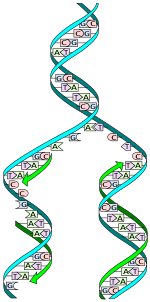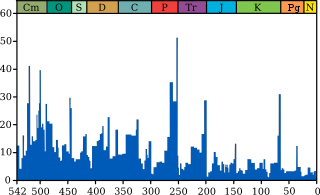Template:Annotated image/testcases
| This is the template test cases page for the sandbox of Template:Annotated image. to update the examples. If there are many examples of a complicated template, later ones may break due to limits in MediaWiki; see the HTML comment "NewPP limit report" in the rendered page. You can also use Special:ExpandTemplates to examine the results of template uses. You can test how this page looks in the different skins and parsers with these links: |
Current
[edit]This page presents samples of the use of Template:Annotated image
Simplest
[edit]Here almost all the formatting parameters of the annotations have been left at their default values. The only exceptions are "Before:" and "After:", which have been made larger, bold and italic.
The caption and the annotation "Microbial mat" contain wikilinks.
If you move the cursor over the template's box you will notice that the image is a lot smaller than the box, but the captions can be placed anywhere in the box.
{{ Annotated image|caption=Test of Template:Annotated image for [[Cambrian substrate revolution]]|image=Cambrian substrate revolution 01.png|width=500|height=300|image-width=364|image-left=68|image-top=20
|annotations=
{{Annotation|7|10|Before:|font-weight=bold|font-style=italic|font-size=15}}
{{Annotation|230|10|After:|font-weight=bold|font-style=italic|font-size=15}}
{{Annotation|25|35|Sessile<br />organism<br />anchored<br />in mat}}
{{Annotation|140|20|Animal<br />grazing<br />on mat}}
{{Annotation|7|100|[[Microbial mat]]}}
{{Annotation|135|272|Firm, layered, anoxic, sulphidic substrate}}
{{Annotation|425|110|Loose,<br />oxygenated<br />upper substrate<br /> with<br />burrowing<br / >animals}}
}}
Setting defaults for annotations
[edit]In this example the parameters annot-color=green and annot-font-family=Georgia, Times New Roman, serif have been applied to set new defaults for the annotations. But in addition special formatting values have been applied to "big bold red sans-serif italic multi-line", over-riding the defaults that have been set for the other annotations.
Note that these changes do no affect the color of the wikilink "Microbial mat".
{{ Annotated image|caption=Test of Template:Annotated image for [[Cambrian substrate revolution]]
|image=Cambrian substrate revolution 01.png|width=500|height=300|image-width=364
|image-left=68|image-top=20|annot-color=green
|annot-font-family=Georgia, Times New Roman, serif
|annotations=
{{Annotation|7|10|Before:|font-weight=bold|font-style=italic|font-size=15}}
{{Annotation|230|10|After:|font-weight=bold|font-style=italic|font-size=15}}
{{Annotation|25|35|Sessile<br />organism<br />anchored<br />in mat}}
{{Annotation|140|20|Animal<br />grazing<br />on mat}}
{{Annotation|7|100|[[Microbial mat]]}}
{{Annotation|135|272|Firm, layered, anoxic, sulphidic substrate}}
{{Annotation|425|110|Loose,<br />oxygenated<br />upper substrate<br /> with<br />burrowing<br / >animals}}
{{Annotation|350|10|big bold red sans-serif<br />italic multi-line|font-weight=bold
|font-style=italic|font-size=15|font-family=Verdana, Arial, sans-serif|color=red|text-align=left}}
}}
Including image map; annotations within image
[edit]In this sample the image occupies the whole of the "canvas" and the annotations are superimposed on the image. The top bar of the image is an image map.
The template can float right or left. In the sample on the left, the annotations are all set to bold, by specifying just one parameter.
{{Annotated image|float=left|width=330|height=230|image-left=10|image-top=10|image-width=310
|annot-font-weight=bold|imagemap=
<imagemap>
Image:Extinction intensity.svg|320px
rect 27 0 77 23 [[Cambrian]]
rect 78 0 117 23 [[Ordovician]]
rect 118 0 143 23 [[Silurian]]
rect 144 0 195 23 [[Devonian]]
rect 196 0 250 23 [[Carboniferous]]
rect 251 0 295 23 [[Permian]]
rect 296 0 342 23 [[Triassic]]
rect 343 0 392 23 [[Jurassic]]
rect 393 0 465 23 [[Cretaceous]]
rect 466 0 504 23 [[Paleogene]]
rect 505 0 525 23 [[Neogene]]
desc none
# A comment, this line is ignored
</imagemap>
|image_width=320
|annotations=
{{Annotation|271|90|[[Cretaceous–Paleogene extinction event|End K]]}}
{{Annotation|195|90|[[Triassic-Jurassic_extinction_event|End Tr]]}}
{{Annotation|177|32|[[Permian–Triassic extinction event|P-T]]}}
{{Annotation|97|110|[[Late Devonian extinction|Late D]]}}
{{Annotation|64|90|[[Late Ordovician mass extinction|End O]]}}
{{Annotation|115|215|Millions of years ago|font-weight=normal}}
|caption=Extinction intensity through time: apparent percentage of marine [[animal]] [[genus|genera]] becoming extinct during any given time interval.
}}
Cropping an image
[edit]
The DNA image on the left was too tall for the associated text, and the next section contained a useful image. Downsizing the DNA image would have made it illegible. But Template:Annotated image with an empty "annotations" parameter can be used to crop an image so that only the important parts are shown. The important parameters for this cunning stunt are width (of the whole box), height (of the whole box), image-width (sets the scale of the image), image-left (a negative value hides the left part of the image) and image-top (a negative value hides the top part of the image).
{{Annotated image|float=right
|caption=The replicator in virtually all known life is [[deoxyribonucleic acid]].
DNA's structure and replication systems are far more complex than those of the
original replicator.
|image=DNA replication split.svg
|width=150
|image-width=150
|height=230
|image-top=-60
|annotations=
}}
References
- ^ Cowen, R. History of Life (3rd ed.). Blackwell Science. p. p. 6. ISBN 0632044446.
{{cite book}}:|page=has extra text (help)
Sandbox
[edit]This page presents samples of the use of Template:Annotated image
Simplest
[edit]organism
anchored
in mat
grazing
on mat
oxygenated
upper substrate
with
burrowing
animals
Here almost all the formatting parameters of the annotations have been left at their default values. The only exceptions are "Before:" and "After:", which have been made larger, bold and italic.
The caption and the annotation "Microbial mat" contain wikilinks.
If you move the cursor over the template's box you will notice that the image is a lot smaller than the box, but the captions can be placed anywhere in the box.
{{ Annotated image/sandbox|caption=Test of Template:Annotated image for [[Cambrian substrate revolution]]|image=Cambrian substrate revolution 01.png|width=500|height=300|image-width=364|image-left=68|image-top=20
|annotations=
{{Annotation|7|10|Before:|font-weight=bold|font-style=italic|font-size=15}}
{{Annotation|230|10|After:|font-weight=bold|font-style=italic|font-size=15}}
{{Annotation|25|35|Sessile<br />organism<br />anchored<br />in mat}}
{{Annotation|140|20|Animal<br />grazing<br />on mat}}
{{Annotation|7|100|[[Microbial mat]]}}
{{Annotation|135|272|Firm, layered, anoxic, sulphidic substrate}}
{{Annotation|425|110|Loose,<br />oxygenated<br />upper substrate<br /> with<br />burrowing<br / >animals}}
}}
Setting defaults for annotations
[edit]organism
anchored
in mat
grazing
on mat
oxygenated
upper substrate
with
burrowing
animals
italic multi-line
In this example the parameters annot-color=green and annot-font-family=Georgia, Times New Roman, serif have been applied to set new defaults for the annotations. But in addition special formatting values have been applied to "big bold red sans-serif italic multi-line", over-riding the defaults that have been set for the other annotations.
Note that these changes do no affect the color of the wikilink "Microbial mat".
{{ Annotated image/sandbox|caption=Test of Template:Annotated image for [[Cambrian substrate revolution]]
|image=Cambrian substrate revolution 01.png|width=500|height=300|image-width=364
|image-left=68|image-top=20|annot-color=green
|annot-font-family=Georgia, Times New Roman, serif
|annotations=
{{Annotation|7|10|Before:|font-weight=bold|font-style=italic|font-size=15}}
{{Annotation|230|10|After:|font-weight=bold|font-style=italic|font-size=15}}
{{Annotation|25|35|Sessile<br />organism<br />anchored<br />in mat}}
{{Annotation|140|20|Animal<br />grazing<br />on mat}}
{{Annotation|7|100|[[Microbial mat]]}}
{{Annotation|135|272|Firm, layered, anoxic, sulphidic substrate}}
{{Annotation|425|110|Loose,<br />oxygenated<br />upper substrate<br /> with<br />burrowing<br / >animals}}
{{Annotation|350|10|big bold red sans-serif<br />italic multi-line|font-weight=bold
|font-style=italic|font-size=15|font-family=Verdana, Arial, sans-serif|color=red|text-align=left}}
}}
Including image map; annotations within image
[edit]In this sample the image occupies the whole of the "canvas" and the annotations are superimposed on the image. The top bar of the image is an image map.
The template can float right or left. In the sample on the left, the annotations are all set to bold, by specifying just one parameter.
{{Annotated image/sandbox|float=left|width=330|height=230|image-left=10|image-top=10|image-width=310
|annot-font-weight=bold|imagemap=
<imagemap>
Image:Extinction intensity.svg|320px
rect 27 0 77 23 [[Cambrian]]
rect 78 0 117 23 [[Ordovician]]
rect 118 0 143 23 [[Silurian]]
rect 144 0 195 23 [[Devonian]]
rect 196 0 250 23 [[Carboniferous]]
rect 251 0 295 23 [[Permian]]
rect 296 0 342 23 [[Triassic]]
rect 343 0 392 23 [[Jurassic]]
rect 393 0 465 23 [[Cretaceous]]
rect 466 0 504 23 [[Paleogene]]
rect 505 0 525 23 [[Neogene]]
desc none
# A comment, this line is ignored
</imagemap>
|image_width=320
|annotations=
{{Annotation|271|90|[[K-T extinction event|End K]]}}
{{Annotation|195|90|[[Triassic-Jurassic_extinction_event|End Tr]]}}
{{Annotation|177|32|[[P-T extinction event|P-T]]}}
{{Annotation|97|110|[[Late Devonian extinction|Late D]]}}
{{Annotation|64|90|[[Late Ordovician mass extinction|End O]]}}
{{Annotation|115|215|Millions of years ago|font-weight=normal}}
|caption=Extinction intensity through time: apparent percentage of marine [[animal]] [[genus|genera]] becoming extinct during any given time interval.
}}
Cropping an image
[edit]
The DNA image on the left was too tall for the associated text, and the next section contained a useful image. Downsizing the DNA image would have made it illegible. But Template:Annotated image with an empty "annotations" parameter can be used to crop an image so that only the important parts are shown. The important parameters for this cunning stunt are width (of the whole box), height (of the whole box), image-width (sets the scale of the image), image-left (a negative value hides the left part of the image) and image-top (a negative value hides the top part of the image).
{{Annotated image/sandbox|float=right
|caption=The replicator in virtually all known life is [[deoxyribonucleic acid]].
DNA's structure and replication systems are far more complex than those of the
original replicator.
|image=DNA replication split.svg
|width=150
|image-width=150
|height=230
|image-top=-60
|annotations=
}}
References
- ^ Cowen, R. History of Life (3rd ed.). Blackwell Science. p. p. 6. ISBN 0632044446.
{{cite book}}:|page=has extra text (help)


